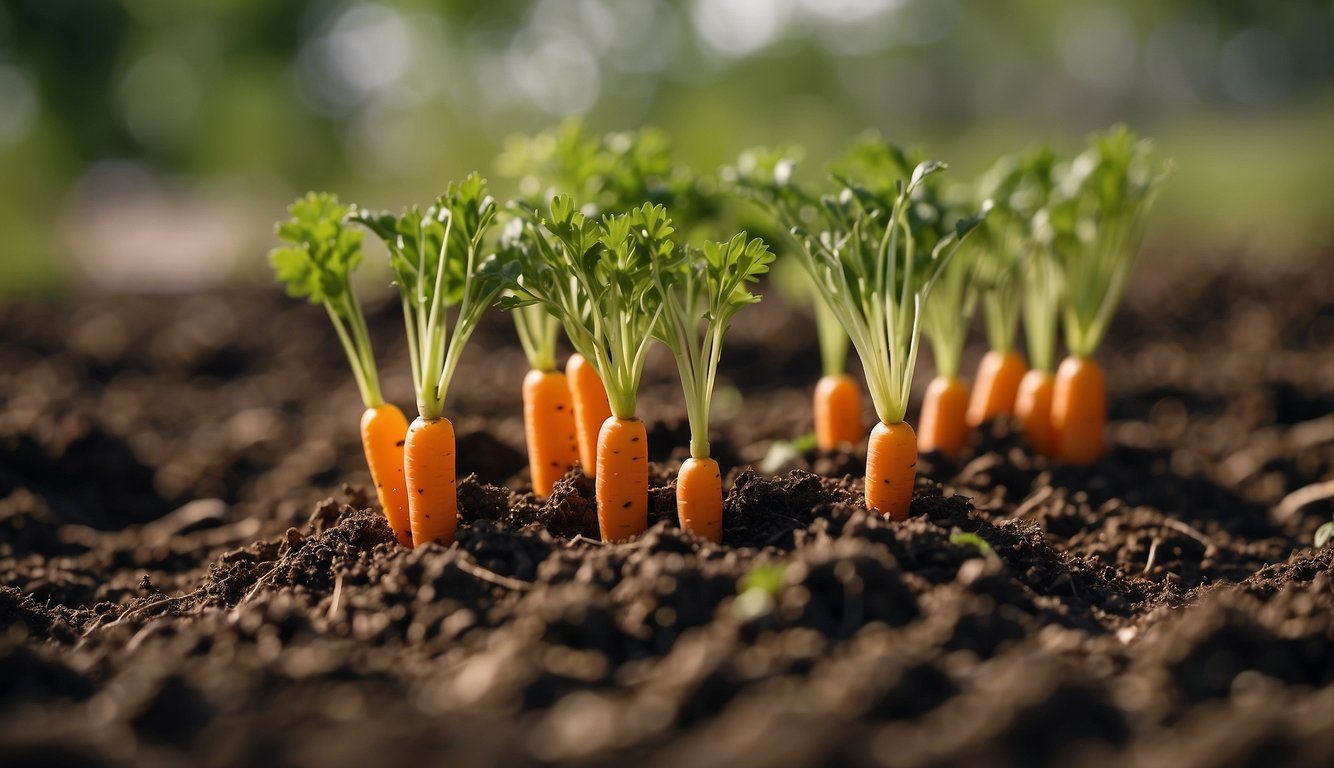TheHerbProf.com is a treasure trove of knowledge for those interested in natural healing and herbal remedies. The website is run by Paul Johnston MD. A naturopathic who has not only received extensive education in the field but also has personal experience in self-healing.
Carrots growing sprouts? Carrots are a versatile and nutritious vegetable that can be grown in a variety of conditions. One way to grow carrots is by sprouting them. Carrot sprouts are a great addition to salads, sandwiches, and other dishes. They are also a good source of vitamins and minerals.
To grow carrot sprouts, you will need to start with fresh carrot seeds. You can either purchase these from a garden center or harvest them from mature carrots. Once you have your seeds, you will need to soak them in water for a few hours to soften the seed coat. This will make it easier for the seeds to germinate. After soaking, drain the water and rinse the seeds thoroughly.
Next, you will need to place the seeds in a sprouting tray or jar. Cover the seeds with a layer of soil or cheesecloth and keep them moist by misting them with water every day. Within a few days, you should see sprouts starting to grow. Keep the sprouts in a warm, well-lit area and continue to mist them daily. After a week or two, your carrot sprouts should be ready to harvest.
Understanding Carrot Sprouts – Carrots Growing Sprouts
Carrots are a versatile root vegetable that can be enjoyed in various ways. Growing carrots from seeds is a rewarding experience that can be easily accomplished with the right knowledge and tools. In this section, I will discuss the basics of carrot sprouts, including what they look like and how long they take to sprout.
What Do Carrot Sprouts Look Like & How to Identify
Carrot sprouts are the first sign of growth after planting carrot seeds. They are small, delicate, and have a unique appearance that distinguishes them from other sprouts. Carrot sprouts typically have two tiny leaves that are smooth and narrow, with a slightly curved tip. The leaves are usually green or yellowish-green and have a soft, velvety texture.
To identify carrot sprouts, it is important to know what they look like at different stages of growth. The first stage of growth is the emergence of the sprout, which usually takes 7-10 days after planting. At this stage, the sprout is small and barely visible above the soil. The second stage is the development of the first true leaves, which can take up to 21 days after planting. The true leaves are larger and more defined than the initial sprout and have a distinct carrot-like appearance.
How Long Do Carrots Take to Sprout – Carrots Growing Sprouts
Carrots take an average of 14-21 days to sprout, depending on the variety and growing conditions. Factors that can affect the germination rate of carrot seeds include soil temperature, moisture, and seed quality. Carrot seeds need to be planted in moist soil that is well-draining and has a temperature of at least 50°F (10°C) for optimal germination.
One way to ensure even and consistent germination is to use seed tape, which is a biodegradable strip that contains evenly spaced carrot seeds. Seed tape eliminates the need for thinning and ensures that each seed has enough space to grow. Another way to improve germination is to soak the carrot seeds in water for a few hours before planting. This helps to soften the seed coat and speed up the germination process.
In summary, understanding carrot sprouts is essential for successful carrot growing. Identifying carrot sprouts and knowing how long it takes for them to sprout can help gardeners monitor their progress and take appropriate action when necessary. By following the guidelines outlined in this section, you can grow healthy and delicious carrots from seed with ease.
Carrots Growing Sprouts
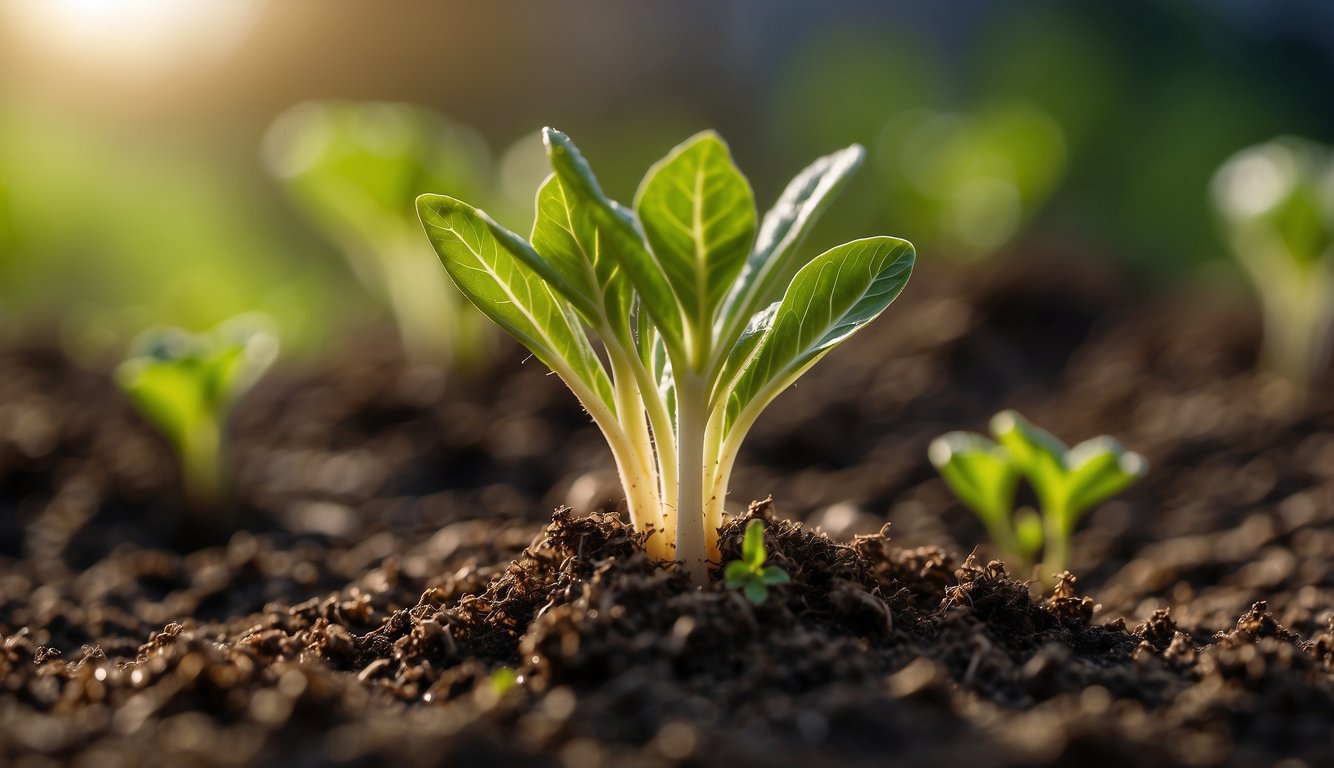
Carrots are a cool-season crop that can be grown from sprouts using either the water or soil method. In this section, I will discuss the two methods and provide tips for growing healthy, tasty carrots.
Water Method
The water method involves sprouting carrot tops in a shallow dish of water. To do this, cut off the top 1 inch of a carrot and place it cut-side down in a shallow dish of water. Change the water every few days and keep the dish in a sunny window. The roots will start sprouting out of the bottom of the carrot stump, and the carrot sprout will turn into a green, lacy plant.
Once the sprouts are a few inches tall, they can be transplanted into soil. Fill a container with loose, well-draining soil and plant the sprout about 1 inch deep. Water the soil well and keep it moist but not waterlogged. Carrots grown from sprouts will be ready to harvest in about 70-80 days.
Soil Method – Carrots Growing Sprouts
The soil method involves sprouting carrot seeds directly in soil. To do this, prepare a garden bed or container with loose, well-draining soil. Sow the seeds rather thickly and thin the plants to 3 to 4 inches apart. If the soil is nutrient-rich and loose, there will be no trouble with root development.
Remember, young, tender, quick-growing carrots are better flavored than old or slow-growing carrots. Grow carrots in the cool time of the year—spring and autumn. Keep up on weeding, and once the carrots have been growing for five weeks, you can use fertilizer to help them continue to grow. Interestingly, carrots should continue growing through a few frosts, which can enhance their flavor.
Mulch the soil with a layer of organic matter to help retain moisture and suppress weeds. Water the soil deeply once a week, especially during hot, dry weather. Carrots need consistent moisture to grow well, but they don’t like to be waterlogged.
Recommended Varieties
There are many carrot varieties to choose from, including Imperator, Chantenay, Little Finger, Solar Yellow, Black Nebula, Purple Carrots, Red Carrots, Paris Market, West Virginia, Bolero, Oxheart, and Purple Dragon. Choose a variety that suits your taste and growing conditions.
Companion Plants – Carrots Growing Sprouts
Carrots grow well with companion plants such as lettuce, peas, and dill. Avoid planting carrots near tomatoes or other members of the nightshade family, as they can attract nematodes and other pests.
Harvesting Carrots
Carrots are ready to harvest when the tops are about 1 inch in diameter and the roots are 6 to 8 inches long. Gently pull the carrots out of the soil and brush off any dirt. Homegrown carrots can be stored in the refrigerator for up to two weeks.
In summary, growing carrots from sprouts is a fun and rewarding way to grow your own homegrown carrots. Whether you choose the water or soil method, make sure to provide your carrots with plenty of space, loose soil, and consistent moisture. With a little care and attention, you can enjoy a bountiful harvest of delicious, nutritious carrots.
Consuming Sprouted Carrots – Carrots Growing Sprouts
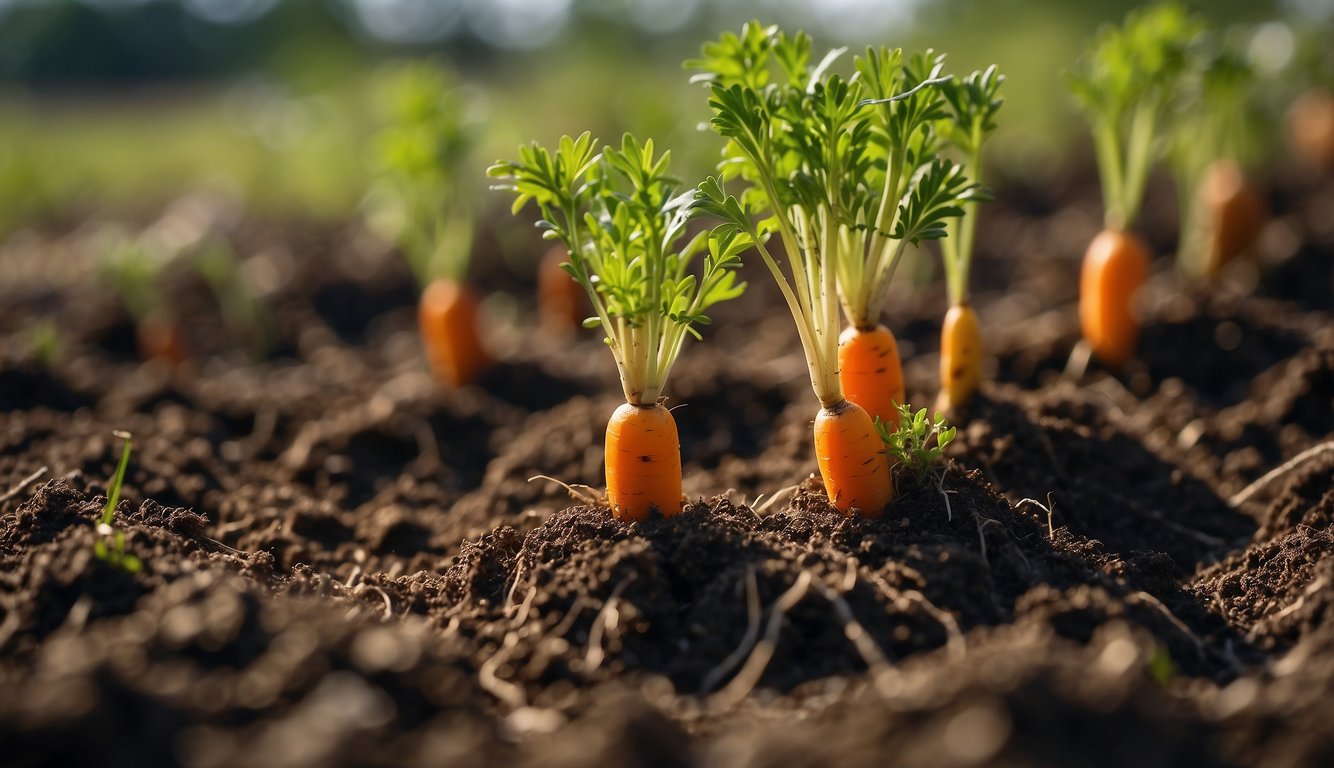
Are They Safe to Eat?
If you’re wondering whether it’s safe to eat sprouted carrots, the answer is generally yes. According to Grower Today, sprouted carrots are safe to eat as long as they are not slimy, moldy, or have a foul odor. However, if you’re pregnant or have a weakened immune system, it’s best to avoid eating sprouted carrots.
When carrots begin to sprout, they are entering a new stage in their life cycle. The tiny green shoots that emerge are actually the carrot’s attempt to grow new leaves, and this process can increase the nutrient content of the carrot. In fact, Chef’s Resource notes that sprouted carrots can provide additional health benefits, such as increased levels of antioxidants and vitamins.
Ways to Eat Sprouted Carrots
If you have sprouted carrots and are wondering what to do with them, there are several ways to enjoy them. One option is to simply cut off the sprouted parts and use the rest of the carrot as you normally would. You can also plant sprouted carrots to grow your own at home, as Chef’s Resource suggests.
Another option is to use sprouted carrots in recipes that call for shredded or grated carrots. The sprouts can add an interesting texture and flavor to dishes such as salads, soups, and stir-fries. You can also roast or steam sprouted carrots to enjoy as a side dish.
It’s important to note that sprouted carrots may have a slightly different flavor than non-sprouted carrots. The sprouts can give the carrots a slightly bitter taste, so you may want to adjust your seasoning accordingly. Additionally, sprouted carrots may not last as long as non-sprouted carrots, so it’s best to use them as soon as possible after harvesting or purchasing them.
Before You Go – Carrots Growing Sprouts
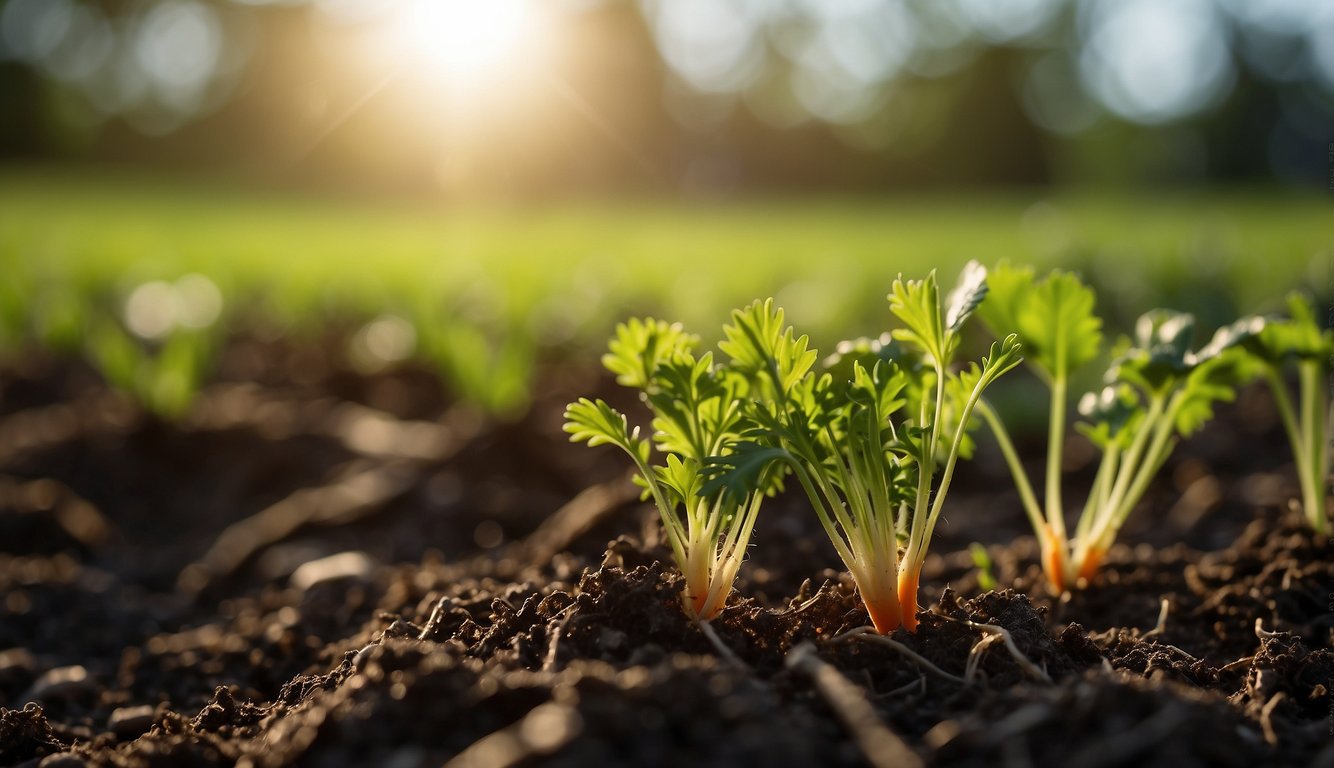
Growing carrot sprouts can be a fun and rewarding experience for any gardener. With the right conditions and care, you can enjoy fresh and healthy sprouts in just a few weeks.
To start, choose high-quality carrot seeds and plant them in a well-draining soil mix. Keep the soil moist and warm, and wait for the seeds to germinate. Once the seedlings have emerged, thin them out to ensure proper spacing and growth.
Throughout the growing process, make sure to provide your carrot sprouts with enough light and water. You can use a grow light or place your sprouts in a sunny window to ensure they get enough light. Water them regularly, but don’t overwater as this can lead to rot.
It’s important to note that while carrot sprouts are nutritious and delicious, they should not be your only source of nutrition. Carrots are a great source of vitamins and minerals, but they are not a complete meal. Make sure to incorporate other healthy foods into your diet as well.
Overall, growing carrot sprouts is a fun and easy way to enjoy fresh and healthy produce. With a little bit of care and attention, you can enjoy delicious sprouts in just a few weeks.
Carrots Growing Sprouts: A Herbalist’s Insight
Today, we’re digging into the world of carrots growing sprouts. Yes, your humble kitchen carrots can sprout and give life to new plants!
First off, let’s talk about why you’d want to grow sprouts from carrots. It’s simple – it’s a fantastic way to witness the miracle of life! Plus, it’s a great way to get kids involved in gardening. They’ll love watching the sprouts grow!
Now, let’s tie this back to theherbprof.com. As your friendly neighborhood Herbalist Blogger, I’m all about helping you nurture your green thumb. And growing sprouts from carrots? It’s a perfect example!
By growing your own carrot sprouts, you’re not just witnessing the cycle of life. You’re also embracing the principles of sustainable gardening, a topic I’m passionate about and often discuss on my blog, theherbprof.com.
So, why not give it a try? Grab a carrot, some water, and a little patience, and start your sprouting adventure. Your green thumb (and your sense of wonder) will thank you!
References – Carrots Growing Sprouts
Little Herb Encyclopedia, by Jack Ritchason; N.D., Woodland Publishing Incorporated, 1995
The Ultimate Healing System, Course Manual, Copyright 1985, Don Lepore
Planetary Herbology, Michael Tierra, C.A., N.D., Lotus Press, 1988
Handbook of Medicinal Herbs, by James A. Duke, Pub. CRP Second Edition 2007
The Complete Medicinal Herbal, by Penelope Ody, Published by Dorling Kindersley
Check the Following Articles!
Pumpkin Fungus Treatment: Get Rid of Fungal Infections
How to Trim Pothos: A Step-by-Step Guide
Gardening in Buckets: A Guide to Container Gardening
Frequently Asked Questions – Carrots Growing Sprouts
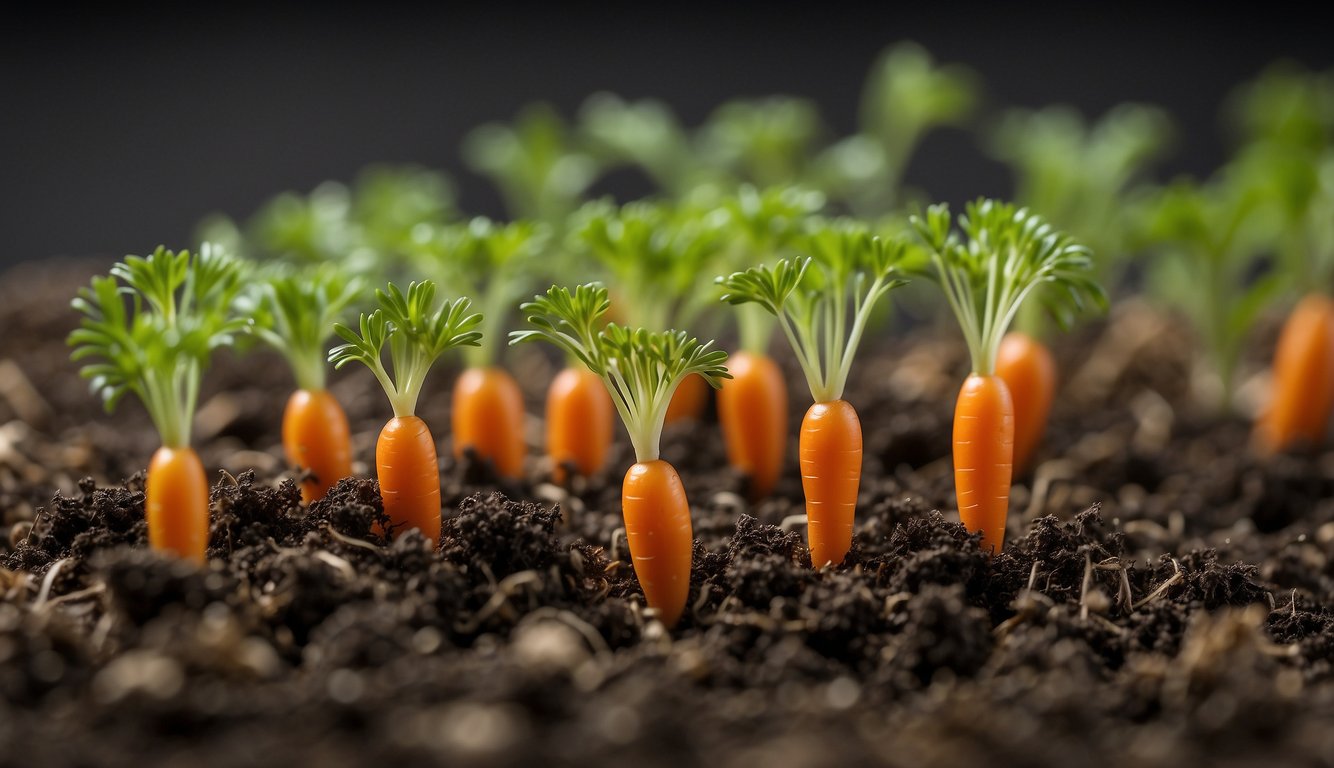
Are sprouted carrots safe for consumption?
Yes, sprouted carrots are safe for consumption. In fact, sprouted carrots are more nutritious than regular carrots and are rich in vitamins and minerals. However, the sprouts may taste slightly bitter, so it is recommended to chop them up and add them to salads or sandwiches.
Can you replant carrots that have started to grow roots?
It is not recommended to replant carrots that have started to grow roots. The roots can become entangled and damage the carrot, making it difficult to harvest. Instead, it is recommended to harvest the carrot as soon as possible and use it in your favorite recipe.
What steps should be taken when carrots begin sprouting white hairs?
When carrots begin sprouting white hairs, it is a sign that they are starting to go bad. It is recommended to discard the carrot and not consume it.
How can you prevent carrots from sprouting in the refrigerator?
To prevent carrots from sprouting in the refrigerator, store them in a plastic bag with some air holes punched in it. This will help to maintain the proper humidity levels and prevent the carrots from sprouting.
What are the identifiable features of a carrot sprout?
Carrot sprouts are small, thin, and have a pale yellow or white color. They have a grass-like appearance and are usually less than an inch in length.
How much time is required for a sprouted carrot to fully grow?
It takes approximately 60-75 days for a sprouted carrot to fully grow. The time required for growth may vary depending on the variety of carrot and the growing conditions.
